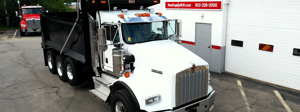
Breaking Down CDL, Non-CDL and NHADA Drug Testing
Correct licensing and drug testing is integral to operating a safe business. This guide is your go to resource for what you need to know about CDL licensing and drug testing in the state of New Hampshire.
PARTNER SPOTLIGHT
Dealer Management System, Computer Technology, Media/Advertising, Automotive Auction, F & I/Aftermarket Products, Automotive Technology Training & Compliance
 A NHADA Gold PARTNER
A NHADA Gold PARTNERComputer Technology, Automotive Shop Equipment, Environmental Services
 A NHADA Platinum PARTNER
A NHADA Platinum PARTNERF & I/Aftermarket Products, Automotive Technology Training & Compliance, Environmental Services
.png?width=150&name=corp_logo_horz_on_light_with_trademark_symbol_1200w%20(002).png) A NHADA Diamond PARTNER
A NHADA Diamond PARTNERWho is required to have a Commercial Driver’s License (CDL)?
Employees who operate vehicles with a GVWR over 26,000lbs, including combined vehicle trailer weight, are required to have a CDL.
What is a non-CDL truck driver?
Any time an employee operates a vehicle over public roadways for commerce and the Gross Vehicle Weight Rating (GVWR) or Gross Combined Weight Rating (GCWR) is over 10,000 lbs., certain US DOT requirements apply.
Do US DOT CDL Drug Testing requirements apply to non-CDL drivers?
No, but non-CDL are subject to NHADA pre-employment 10 panel drug testing requirements. The results of the test are not reportable to the US DOT Clearinghouse.
To learn more about a non-CDL truck driver please reference this article.
What are the drug testing requirements for CDL drivers?
The US DOT (United States Department of Transportation) requires a 5 panel drug test for the following substances:
- Marijuana
- Cocaine
- Opiates – Opium and Codeine derivatives
- Amphetamines and Methamphetamines
- Phencyclidine – PCP
Who must be drug tested?
All CDL drivers operating commercial motor vehicles (CMVs) (greater than 26,000 GVWR, or transporting more than 16 passengers, including the driver, or placarded hazardous materials) on public roadways must be DOT drug and alcohol tested. This applies to any driver required to possess a CDL, including those employed by Federal, State, and local government agencies, “owner operators,” and equivalently licensed drivers from foreign countries. Part-time drivers must also be included in an employer’s drug and alcohol testing program. Drivers who only operate CMVs on private property not open to the public do not require testing.
Required Testing for CDL Drivers
Pre-Employment
New drivers must be drug tested with a negative result before an employer can permit them to operate a CMV on a public road. Alcohol testing is permitted only if it applies to all CDL drivers. If a driver is removed from a random testing pool for more than 30 days, the driver must again be pre-employment tested.
Post-Accident
CDL drivers must be drug and alcohol tested whenever they are involved in a fatal accident, or receive a traffic citation resulting from an injury or vehicle-disabling accident. The alcohol test must occur within 8 hours, and the drug test must occur within 32 hours.
Random-Testing
CDL drivers are subject to unannounced random testing. A driver may be directed to take a drug test even when at home in an off-duty status. Random alcohol testing may only occur when the driver is on-duty or immediately before or after. Once notified to report for random testing, the driver must immediately report to the testing location. A delayed arrival may be considered a refusal which is equivalent to testing positive.
Reasonable Suspicion
DOT-Trained supervisors can direct a driver to be drug or alcohol tested whenever he or she exhibit signs of drug or alcohol abuse. The decision must be based on observations concerning the appearance, behavior, speech, or body odors of the driver.
Return-to-Duty
Return-to-duty tests require “direct observation” as prescribed in 49 CFR 40.67. They are only required after an employee has completed the “return-to-duty” process, before returning to perform a safety sensitive function (i.e., driving CMVs). They may replace the pre-employment test for “positive” tested and “refusal” drivers.
Follow-Up
Follow-up drug and alcohol tests are required as prescribed by the substance abuse professional (SAP) who signs the return-to-duty report. They consist of a minimum of at least six unannounced directly observed tests conducted during the first 12 months following the return-to-duty test. The SAP can prescribe follow-up testing for a maximum of 5 years for drivers who have tested “positive” or “refused to test.” Follow-up testing is in addition to any selections for random testing.
Have you ever wondered whether one of your employees was under the influence of drugs or alcohol and were not sure what to do about it? Knowing how to handle such a situation could save you money, headaches, legal troubles, and make a big difference for the employee involved. Check out NHADA'S Pre-Employment Drug Testing Training Webinar on October 29, 2020. It is important to understand that the Reasonable Suspicion Training must include the individual pieces of DOT regulations regarding reasonable suspicion testing are covered in the training to be compliant. If you would like assistance with guidance please do not hesitate to reach out to your NHADA Loss Prevention Representative.
The DOT Drug & Alcohol Clearinghouse (effective January 6, 2020)
The Drug & Alcohol Clearinghouse is an online database that houses drivers’ non-negative drug and alcohol test results, as well as information about their participation in a return-to-duty program. Employers will be required to check this database before hiring a new safety-sensitive driver, as well as annually for the remainder of each driver’s employment. All information regarding drug and alcohol violations will stay publicly available in the Clearinghouse for five years or until the return-to-duty process is complete (whichever is later).
How to comply with DOT Drug & Alcohol Clearinghouse
Employers
Once registration opens, you’ll be required to register for the Clearinghouse so that you’ll have the ability to conduct queries and report drug and alcohol violations to the Clearinghouse. You’ll also need to designate your Third Party Administrator (TPA) so they have access to your account and can conduct queries on your behalf. Please note that for owner-operators, this is not an optional step.
By registering for an account and designating a TPA now, you’ll be ready to begin using the database. If you have a DOT#, you can register right from your FMCSA Portal account.
Drivers
If you’re a safety-sensitive driver, you are required to create a Clearinghouse account where employers can both report and check for drug and alcohol violations (you’ll need to give consent within the portal before they can pull a full report). Your account will also allow you to review your Clearinghouse record at any time to see if any violations have been reported by an employer. If you find information that is inaccurate, you’ll have an opportunity to have it removed.
Once you register for a Clearinghouse account, you’ll also be able to login to give employers consent prior to running a full query of your record. If you receive a drug and alcohol violation in the future, you’ll also be able to select a SAP from within your account. This allows them to update your record with information on your return-to-duty program.
What are the NHADA Workers’ Compensation Trust (WCT) Pre-Employment Drug Testing Requirements?
The NHADA WCT requires a 10-panel drug test for any new hire. A 10-panel test includes:
- Marijuana (THC)
- Cocaine
- Amphetamines
- Phencyclidine (PCP)
- Opiates
- Barbiturates
- Benzodiazepines
- Methadone
- Oxycodone
- Methamphetamine
It is the members’ choice as to whether or not to test for marijuana, but you must clarify this with your pre-employment drug testing facility prior to the potential hire’s test.
Where to get Drug Tests
There are many drug testing facilities in New Hampshire that can meet your drug testing needs, including those companies in need of a Third Party Administrator (TPA) for their CDL operators drug testing needs. You can find the nearest facility in the NH Drug Testing Facility Directory. Please reach out to your NHADA Loss Prevention Representatives if you need any assistance or guidance.
NHADA Strategic Hiring Guidelines
The NHADA WCT Loss Prevention Staff and the labor and employment law experts at Devine Millimet have developed the NHADA Strategic Hiring Guidelines. The NHADA Strategic Hiring Guidelines provides all the information and resources required for developing and implementing drug testing policies and procedures.
If you have any questions regarding CDL, non-CDL and NHADA WCT drug testing requirements please contact Pat Austin at 1-800-852-3372 or paustin@nhada.com.


















.png?width=150&name=Ally_Final%20Logos%20and%20Pairings_11.14.2018-01%20(2).png)


-2.png?width=150&name=Wipfli%20Logo%20Blue%20RGB%20(1)-2.png)


.jpg?width=150&name=NHADA_Partner_FTR_Img_NHADA_Insurance%20(1).jpg)


.jpg?width=150&name=NHADA_Partner_FTR_Img_JMA(1).jpg)


